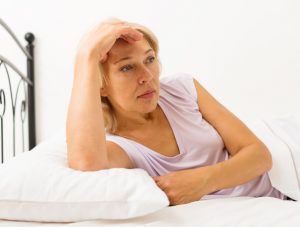
Those who believed they experienced frequent hot flashes were more likely to develop mild symptoms of depression, compared to those with few to no nighttime hot flashes. On the other hand, the actual number of hot flashes was not associated with a higher risk of depression.
Furthermore, sleep interruptions were also associated with a higher risk of depression symptoms. No association was found between daytime hot flashes and mood changes.
First author Dr. Hadine Joffe said, “When women were awake long enough to later recall nighttime hot flashes, that perception contributed to mood disturbance in women whose estrogen levels had fallen. The results of our research suggest menopausal women who report experiencing nighttime hot flashes and sleep disruption should be screened for mood disturbances. Any treatment of mood symptoms in this population also should incorporate efforts to address sleep and nighttime hot flashes.”
Related: How long does menopause last?